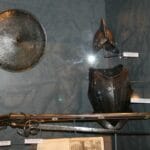The Allure and Devastation of Inca Gold
The allure of gold has captivated civilizations for centuries, and the tale of Pizarro and the Inca Empire stands as a stark reminder of its intoxicating power and devastating consequences. When Spanish conquistadors, led by the ambitious Francisco Pizarro, arrived on the shores of present-day Peru in the 16th century, they encountered the Inca Empire, a civilization renowned for its wealth and cultural sophistication. The encounter, however, would prove catastrophic for the Inca, forever altering the course of their history.
In 1532, Pizarro, driven by an insatiable thirst for gold and fueled by rumors of Inca riches, orchestrated a cunning plan. He lured the Inca Emperor Atahualpa into a carefully staged meeting in the city of Cajamarca. What Atahualpa believed to be a diplomatic encounter quickly devolved into a brutal betrayal. Atahualpa, the powerful leader of the Inca, found himself a prisoner within his own land.
Desperate to secure his freedom, Atahualpa made Pizarro an offer that astonished the conquistadors – a room filled with gold and twice as much silver. It seemed an impossible ransom, yet the Inca, valuing their leader’s life above all else, diligently fulfilled their end of the bargain. The conquistadors watched in awe as unimaginable wealth poured into their hands. However, Pizarro, his lust far from satiated, made a chilling decision. He broke his word, executing Atahualpa on August 29, 1533 – an act that forever poisoned relations between the two civilizations and solidified the Spanish thirst for gold as the death knell of the Inca.
The Brutal Conquest and the Plunder of a Civilization
The Inca, caught off guard by the Spaniards’ ruthlessness and superior weaponry, found themselves outmatched. What followed was a period of immense suffering. The conquistadors, blinded by their lust for gold, launched a brutal campaign across the empire. Massacres became commonplace, forced labor was the norm, and European diseases, to which the Inca had no immunity, swept through the land, decimating the population.
The conquistadors, like a plague of locusts, swarmed through the Inca Empire, leaving a trail of destruction in their wake. Cities were looted, temples desecrated, and the Inca people subjected to unimaginable cruelty. Driven by insatiable greed, they forced the Inca to toil in dangerous mines, extracting the precious metals that would fuel Spain’s burgeoning empire. This brutal system of forced labor, coupled with the devastating impact of European diseases, decimated the Inca population. The once-thriving civilization was brought to its knees, not by military might alone, but by the insidious power of disease and the relentless pursuit of gold.
Unraveling the Mysteries of Lost Inca Gold: Fact or Fiction?
Despite the immeasurable wealth the Spanish plundered, whispers and legends persist to this day – tales of hidden treasures, of portions of Atahualpa’s ransom spirited away to secret locations. The Llanganates Mountains of Ecuador, shrouded in mist and mystery, have become synonymous with the legend of the lost Inca gold. For centuries, adventurers and treasure hunters have been drawn to these mountains, fueled by the allure of untold riches and the possibility of uncovering history’s secrets.
Some researchers suggest that the legends, passed down through generations, may hold a kernel of truth. They point to ancient Inca trails winding through the mountains and local folklore that speaks of hidden entrances to vast caverns. Others propose that Rumiñahui, a skilled Inca general, managed to secure a significant portion of the ransom as the Spanish closed in. Rumiñahui, recognizing the gravity of the situation, likely ordered the treasure hidden deep within the Llanganates, hoping to keep it from falling into Spanish hands.
The Enduring Legacy of Pizarro’s Gold
The story of Pizarro and the Inca gold is a tragic one, a stark reminder of the destructive power of unchecked ambition and the human cost of greed. It serves as a cautionary tale, reminding us that the pursuit of wealth and power, when pursued ruthlessly and without regard for human life or cultural heritage, can lead to devastating consequences. The echoes of this lost empire still resonate in the Andes, a testament to their legacy and a solemn reminder of the human cost of conquest.
The quest for lost Inca gold continues, a testament to our endless fascination with history’s mysteries. While the complete truth may remain elusive, the pursuit itself provides a valuable opportunity for historical investigation. By delving into the events surrounding the Spanish Conquest, we gain a deeper understanding of the complex interplay of ambition, cultural misunderstanding, and the enduring allure of gold that shaped this pivotal period in history.
Key Insights:
- The allure of unimaginable wealth, whispered in the ears of Pizarro and his men, ignited a firestorm that would consume the Inca Empire.
- Atahualpa’s attempt to buy his freedom backfired spectacularly, proving that even mountains of gold were no match for Spanish treachery.
- The Spanish conquest was more than just a changing of the guard; it was a brutal campaign of violence, cultural erasure, and systematic subjugation.
- The legend of the lost Inca gold continues to intrigue, but it’s crucial to remember the human cost, the countless lives lost and cultures shattered, that paved the way for such myths.
- Pizarro’s story stands as a cautionary tale for all time; a stark reminder that the pursuit of wealth, when taken to extremes, can have devastating consequences.
Learn more about Nebuchadnezzar, who reigned during the Neo-Babylonian Empire, another ruler driven by ambition and the pursuit of power. Explore the Ossuary Church Prague, a unique and chilling destination that houses the remains of thousands of individuals, a stark reminder of the fragility of life and the enduring presence of death.
- SYBAU See You Baby Meaning: Gen Z Slang Evolves - July 1, 2025
- Unlock Your Inner Youth: Lifestyle Secrets for a Vibrant Life - July 1, 2025
- Decode SYBAU Meaning: Gen Z Slang Explained - July 1, 2025





